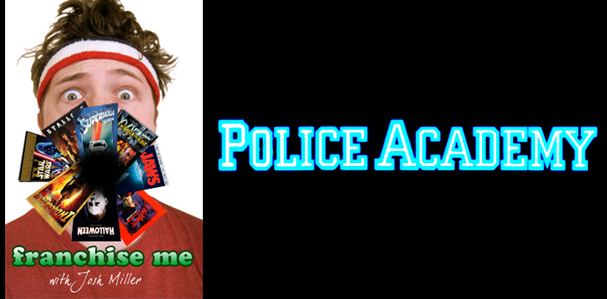
Hollywood loves a good franchise. The movie-going public does too. Horror, action, comedy, sci-fi, western, no genre is safe. And any film, no matter how seemingly stand-alone, conclusive, or inappropriate to sequel, could generate an expansive franchise. They are legion. We are surrounded. But a champion has risen from the rabble to defend us. Me. I have donned my sweats and taken up cinema’s gauntlet. Don’t try this at home. I am a professional.
.
The Franchise: Police Academy — following the wacky lowbrow exploits and tribulations of a police academy graduating class as they blunder their way through the world of law enforcement while always remaining disrespected underdogs. The series stretched over seven films from 1984 to 1994, as well as two seasons of an animated television series (1988-1989) and a single season of a live-action sitcom (1997).
Btw: anyone who actually has a copy of either the animated and/or live-action TV series, please contact me.
The Installment: Police Academy (1984)
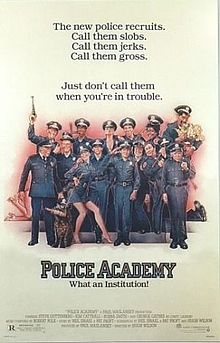
The Story: We open with a text block informing us that the new mayor of the film’s unspecified metropolitan setting has altered the enrollment practices of the police force. Now the police academy needs to accept any willing recruits. You just know that means they’re gonna get some wacky misfits! So then we get a little montage of our various central characters, respectively establishing their unique one-note personality traits: Tackleberry (David Graf) is an over-zealous gun nut; Hightower (former NFL Pro Bowler Bubba Smith) is huge and black; Leslie (Donovan Scott) is fat; George Martin (Andrew Rubin) is a ladies man; Jones (Michael Winslow) makes cooky sound FX; Hooks (Marion Ramsey) has a quiet voice; Fackler (Bruce Mahler) is accident prone. And at the center of it all is Mahoney (Steve Guttenberg), a rascally wiseass who is sent to the police academy as punishment for getting arrested. Mahoney isn’t allowed to quit (or he’ll go to jail), which means that he’s going to try his damnedest to get kicked out. Unfortunately for him, Cmndt. Lassard (George Gaynes) has been informed that he isn’t allowed to boot anyone, they need to quit on their own. Conflict! So Mahoney misbehaves and such, all while trying to bag the sexy Cadet Thompson (Kim Cattrall) and pissing off his instructor, Lt. Harris (G. W. Bailey).
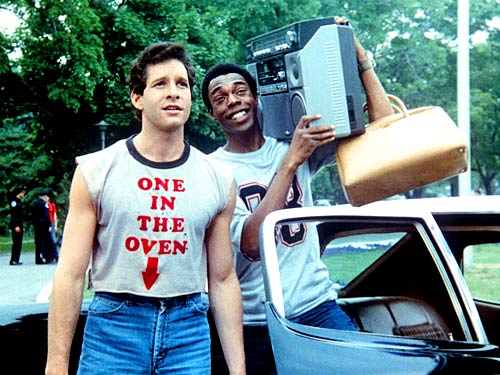
What Works: If we can all accept that there is nothing wrong with a stupid low-brow comedy (and I sure as shootin’ don’t think that there is), than most everything works in Police Academy. Though the film was directed and rewritten by WKRP in Cincinnati creator Hugh Wilson, it feels more attuned to the oeuvre of the brief but fairly iconic screenwriting partnership of Pat Proft and Neal Isreal, who in two years pulled off an 80’s party-comedy hat trick with this film, Bachelor Party and the Val Kilmer minor classic, Real Genius. Like those other films, Police Academy is very male-centric (“fratty” is the term that seems to pop up most frequently these days), crass, childish, and often border-line offensive, but manages to walk away with clean hands because of its pervasively genial and good-spirited tone.
The film has a lot of legitimately good lines and bits tossed in amongst all the silly idiocy. As a kid I was of course drawn to the sillier characters and moments, but in reality the heartbeat of the film’s comedy comes largely from the villains and figures of authority. Two of the funniest characters in the film are Cadets Blankes (Brant Von Hoffman) and Copeland (Scott Thomson), two suck-ups that Lt. Harris enlists to spy on and sabotage Mahoney. Classic “fratty” sycophantic stooge archetypes, pretty much everything Blankes and Copeland do or say or fall victim to is hilarious. From simple gags like visiting the academy’s barber to get their heads shaved, only to learn afterwards that all they needed was a trim: “This isn’t the army.” To inane dialogue, like “cleverly” referring to Mahoney as “Ma-homo.” To larger and broader set-pieces, like mistakenly entering and getting trapped in The Blue Oyster, a biker gay bar that would become an on-going gag in the franchise and a much ripped-off bit.
The two best characters, and the two best performances, easily go to George Gaynes as Lassard, and G. W. Bailey as Lt. Harris. Lassard is a delightfully weird character. Generally films like these follow a classic villain hierarchy model, with an antagonistic central power figure supported by a series of jackassy underlings, but Lassard is a likable character whose only villainous qualities are his indifference and sheer incompetence, which at times admittedly work against our heroes. Despite being the top dog at the academy, he seems spiritually in line with the cadets. When Mahoney asks him, “I’m trapped here?” Lassard responds, “Why yes, we all are.” Gaynes (who also found success in the 80’s on TV, with Punky Brewster) is just fantastic as Lassard, as he manages to save some easily terrible moments. Most notable is the scene in which Mahoney is hiding in a podiom with a hooker while Lassard is giving a speech. Through some wacky farce, the hooker thinks she’s supposed to blow Lassard, which she does, while Mahoney is trapped in there with her. The button on the scene is Lassard seeing Mahoney poke his head out of the podium afterwards, and – gasp! – thinking he was blown by Guttenberg. It is not a great scene on paper, but watching Gaynes struggle through his speech is comic gold and he even manages to make the homophobia follow up jokes sing. There is just something about Gaynes meandering eyes and fluttery voice that makes everything he says lovable. And funny.
G.W. Bailey has the best part, script-wise. He’s the R. Lee Ermey of Police Academy, always yelling insults and flying off the handle. To this day, Lt. Harris remains the quintessential “middle management asshole” in my mind. And for good reason. Bailey brings it, managing to turn non-jokes – like simply yelling “Move it, move it, moooove it!” – into quotable one-liners. My favorite Harris bit is actually a scene in which he’s teaching a class, writing everything he says on the chalkboard in an incomprehensible shorthand while the classroom stares in bewilderment.
And of course we have our wacky motley crew of misfit cadets. As a grown man the vast majority of these characters fail to amuse me as they once did, but the film keeps the jokes coming fast and furious enough that it all feels like harmless fun. And it is fun. Tackleberry going apeshit during his shooting range test. The sexy Sgt. Callahan (Leslie Easterbrook) forcibly seducing George Martin. Hightower turning over a cop car after being called a “jiggaboo.” All good silly times. Very silly times. Despite being rated R, this feels like a movie aimed at middle-school and junior high boys — who unsurprisingly ended up the target demo for all the sequels.
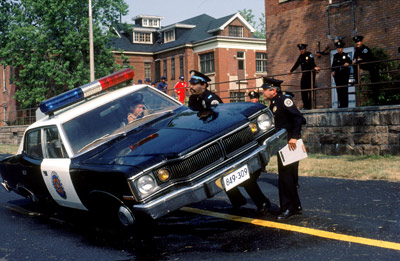
What Doesn’t Work: While it would be easy to pick on the jokes that don’t work in the film (Harris getting his head stuck in a horse’s anus), that’s just par for the course with a comedy like this and the success-to-failure ratio on the jokes leans heavily on the success side. So let’s dig a little deeper…
Police Academy may be the apex of the iconoclastic “fratboy” style of comedy so prevalent in the late 70’s and 80’s, if for no other reason than it is so utterly devoid of substance beneath all its relentless clowning. Even Animal House, the godfather of the subgenre, had a relatable foundation from which it could go gonzo. Police Academy is all gonzo fluff, and while it is saved by the competency of its execution, the complete triviality of film eventually causes it some problems once we reach Act III.
It would be easy to blame this problem on the cartoony nature of the characters, but I don’t think that’s actually a problem. The problem is that we don’t know anything about these characters or their motivations. Mahoney doesn’t want to be a cop. He’s forced to be at the academy. But why are these other weirdos trying to become cops? Tackleberry’s motivations seem implicit; he wants to fire guns. Leslie seems to want to be a cop purely so street punks will stop picking on him. Okay, I can accept both of those. But what about accident prone Fackler? Why does he want to be a cop? Hightower is a florist, why does he want to shift professions? Ladies man George Martin? Hooks? While we’re at it, why does Jones makes sound effects all the time? He is basically mentally unstable, but no one seems to care. There is a moment, during a T&A heavy bonfire party, where Mahoney and Thompson take a walk together. This seems the ideal moment to add some actual character to these characters, and it almost happens. Mahoney actually asks Thompson why she wants to be a cop. Her response? “I like to dress like a man.” Well, so much for that.
It’s not that the film needs these contexts to be funny. It doesn’t. But at times the film positions itself in such a way that we’re supposed to care about the characters. But they’re just two dimensional cartoons. This makes the final third of the film feel clumsy and boring at times. I don’t know why any of these people want to be cops, so I don’t really care if any of them become cops. I’m just here for the party, so to speak. And the Rube Golderbergian events that lead to a massive riot during the climax feel like a film struggling to find an Act III after using up all its previous time with frivolous antics (I Love You Man had a similar problem). There simply isn’t a real conflict in the film, thus there isn’t anything to bring to a head. The “threat” at the end is lamely manufactured.
Oddly enough I think one of the film’s biggest problems is one of its greater successes. Steve Guttenberg is obviously something successful about the film. People liked Mahoney. And Guttenberg is charming as the character in that Guttenbergian way. Yet, stepping away from the presentation and just looking at what’s unfolding before our eyes, Mahoney is a terrible hero. He’s a classic “fratty” comedy hero — an underdog alphadog who we root for because of his wry charm and party-hardy ways, but who displays psychopathic tendencies. Mahoney’s introductory scene is a perfect example. Mahoney works at a car lot, and a snotty guy shows up demanding special treatment even though Mahoney tells him the lot is full. The filmmakers make sure to make this guy a colossal asshole so that we’ll feel whatever Mahoney does to him is justified. When Mahoney’s boss sides with the asshole and tells Mahoney to park the car or take a hike, Mahoney (using some amazing stunt driving skills he apparently possesses) tips the car up on two wheels and crams it violently between two other cars. Ha ha. Take that asshole! That’s what you get for being an asshole! Wait.. what about those two other cars that Mahoney destroyed while fucking up that asshole’s car? The owners of those cars didn’t do anything to Mahoney? Um… yeah, well, uh… fuck them too! This is just how Mahoney rolls! He’s above society! He is Niche’s ubermensch!
This questionable hero/villain dance extends across the entire film. The set-up gimmick that Mahoney needs to get himself kicked out of the police academy is very fun. Sure, we need to forget the fact that he’s actually getting special treatment from a family friend in the police force for a legitimate crime he committed, but whatever. It’s a good set-up. And again the filmmakers make sure that Mahoney is only causing problems for total assholes. Yet, we’re still left with an awkward situation for our good vs evil power struggle. Our villains are villains basically because they oppose Mahoney. Sure, they’re also villains because they want to wash out all the shitty recruits, but realistically speaking, that’s exactly what an actual police academy should fucking do (you don’t want unqualified people on the police force, do you?). So, our villains oppose Mahoney, but Mahoney is purposefully misbehaving to get in trouble. He isn’t a real underdog. He doesn’t even want to be a cop. So basically our villains are being punished for simply doing their job and standing in the way of some fuckface who doesn’t respect what they do or the institution they have devoted their life to. But, you know, they’re assholes so fuck them. And Mahoney is a cool dude. We’re supposed to view him like Bugs Bunny, only Bugs was generally a legit victim. And even when he wasn’t, his films were only five minutes long, so the implications of his anti-social behavior weren’t as relevant.
I think this hero-villain paradox is best represented in a scene in which Mahoney is drinking a beer, spying on the female cadets showering. It’s a very calm moment (this isn’t Bluto on the ladder from Animal House). It’s serene. Almost innocent. Until Lt. Harris catches Mahoney. He confiscates Mahoney’s beer and makes him leave. Then, as an afterthought Harris turns his head and looks at the showering girls. At that exact second they see him (having not noticed Mahoney) and scream. It’s funny. So we laugh. But what’s really happening here is we’re saying it was totally fine for Mahoney to be spying on these girls, cause he’s Mahoney, but when Harris does it is creepy and gross and he should be karmically punished. Cause he’s an asshole. But really, Mahoney is the asshole. That is a slightly esoteric criticism, of course.
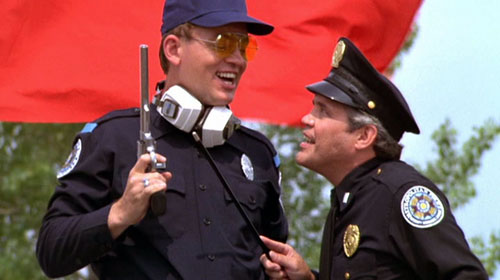
Take That Reality: After never driving a car before in his life, Hightower not only learns to drive within minutes of Mahoney “teaching him,” but becomes amazing enough to successfully evade pursuing cops in a chase.
Most Gratuitous T&A: During the cadets’ big bonfire party, there is a single shot in which a string of female extras parade past the camera, individually, inexplicably removing their bikini tops one-by-one. It is possibly the height of uncreative, no-reason nudity.
Most Childish Gag: Definitely Harris getting his head crammed up a horses’ ass.
Best Prank: Gotta give it to the classic shoe polish on the megaphone mouth piece prank Mahoney pulls on Harris. Simple, effective, and easily replicated in real life.
Best Authoritarian Figure Dialogue: Lt. Harris to weight challenged Leslie…
Harris: I could show a movie on your butt, fatso!
Best Rascally Hero Dialogue:
Harris: You make me sick.
Mahoney: Thank you, sir. I make everybody sick.
Best Jones Sound Effect Bit: Creepily pretending to play a video game in his room at night. I pick this one because he’s not doing it as a prank or for anyone else’s benefit. He’s just doing it, alone. Which I think proves that he’s completely insane.
Should There Have Been A Sequel: Why not? Fun tone, a host of characters to play with. Bring it.
Up Next: Police Academy 2: Their First Assignment
.
previous franchises battled
Leprechaun
Tremors
Critters
Death Wish